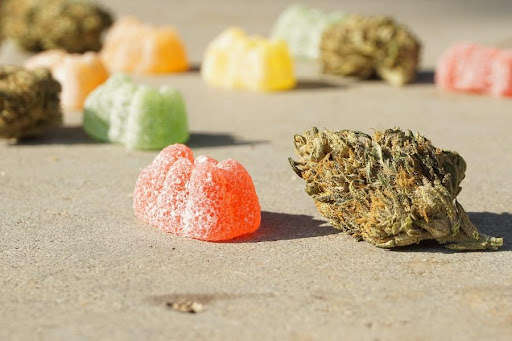Cannabis and its derivatives have been holding center stage in the health and wellness world for quite some time now. There’s been a lot of talk about the potential health benefits of cannabis and the numerous ways in which it can help people improve the quality of their lives, but opinions are still divided. Some claim cannabis is a miracle worker, and those who argue that things have been blown out of proportion and the excitement regarding cannabis is nothing but smoke and mirrors.

But an aspect that we can all agree upon is that the cannabis hype is real, whether you believe in the therapeutic properties of the ingredient or not. Cannabis has gotten so much coverage in the media lately that it’s hard to ignore or escape the worldwide phenomenon it has created. And now, we have another compound in the cannabis family that’s been making headlines, challenging the supremacy of THC and CBD – delta-8 THC.
Delta-8 THC, although it’s not technically a novelty in the cannabis industry, has experienced a resurgence in recent years, garnering a lot of attention from cannabis enthusiasts and not only. So, the question is should we care about delta-8 THC and give in to the craze surrounding it, or should we simply move on? Let’s check out what experts have to say on the topic to gain a bit of clarity in this respect.
What is delta-8 THC?
A good starting point would be to look at the science behind the craze and see what researchers have discovered about delta-8 THC. We know that delta-8 tetrahydrocannabinol is a substance found in the cannabis Sativa plant, closely related to delta-9 THC, and it’s just one of the many cannabinoids that the scientific community has studied. Since delta-8 THC only occurs in very low quantities in cannabis, most commercial delta-8 comes from synthetizing hemp-derived CBD or THC.
A brief glimpse into the compound’s history teaches us that the first known synthesis of delta-8 THC took place in 1941; the compound remained largely unresearched until 1965 when the full synthesis of the substance was achieved. Even after this point, research on delta-8 THC remained limited, most of the experiments being conducted on mice. Given the restrictions on scientific studies, most of the information we have on delta-8 THC’s properties and benefits comes from anecdotal evidence provided by consumers.
What’s the difference between delta-8 THC and delta-9 THC
There’s a common denominator between delta-8 THC and delta-9 THC, most commonly referred to as THC, so we have to delve deeper into scientific research to figure out where these two compounds meet. The similarities are not limited to the name but have to do with their chemical makeup. The molecular structure of delta-8 THC and delta-9 THC is almost the same – the only distinguishing element is the placement of a double bond on the carbon ring.
If that sounds a bit too sciency for you, we’ll make it easier to understand by explaining how that translates in terms of effects. Delta-9 THC is famous for its psychoactive properties that give users a euphoric sensation by binding to the CB1 receptors in the body’s endocannabinoid system. The difference in the chemical structure makes delta-8 THC’s bond with the CB1 receptors less strong, so the feelings of euphoria and relaxation you may get from the compound are much milder.
Is delta-8 THC legal?
Delta-8 THC’s legal status is a rather sensitive topic where scientific contribution doesn’t help much since it’s up to the authorities to offer clarifications. Since delta-8 THC is an isomer of delta-9 THC, and it has psychoactive properties, many people tend to associate the two and consider it illegal. However, on a federal level, there’s no law prohibiting the commercialization of delta-8 THC products.
Moreover, the 2018 US Farm Bill has legalized the cultivation of hemp (the cannabis variety with a concentration of less than 0.3% THC); thus, all products derived from it are also legal. The problem arises from local lawmakers, some of which have placed bans on delta-8 THC, and the constantly changing legal landscape that makes it difficult to keep up with regulations regarding cannabis-derived products.
What’s the best way to consume delta-8 THC?
Delta-8 THC products are a dime a dozen these days, which allows you to choose from an extensive range of options and find premium delta 8 gummies near you or any other type of delta-8 THC-infused goods with ease.
But what’s the best way to take delta-8 THC? There are different ways to consume delta-8 THC and introduce it into your routine. The ideal consumption method greatly depends on your lifestyle and personal preferences, so you have to figure out which one works best for you. Smoking or vaping delta-8 THC is great if you want to enjoy immediate effects since they allow the compound to enter directly into your bloodstream.
Edibles offer an easy way to integrate delta-8 THC into your wellness routine, ensuring precise dosage and convenience. Tinctures and capsules are also very popular consumption methods that provide high bioavailability. Lastly, delta-8 THC topicals can be used locally on the skin’s surface, so you can enjoy the compound’s benefits without worrying about getting high.
Do your research
A key aspect in choosing products related to health and wellness is conducting proper research. As with any other market rapidly flourishing and garnering attention, many subpar products can do more harm than good.
So, before you jump on the delta-8 THC bandwagon, experts advise you to do your homework and check the manufacturers and companies you want to purchase products from to ensure you’re making a wise investment. That should help you find the best products on the market and keep you on the safe side.





